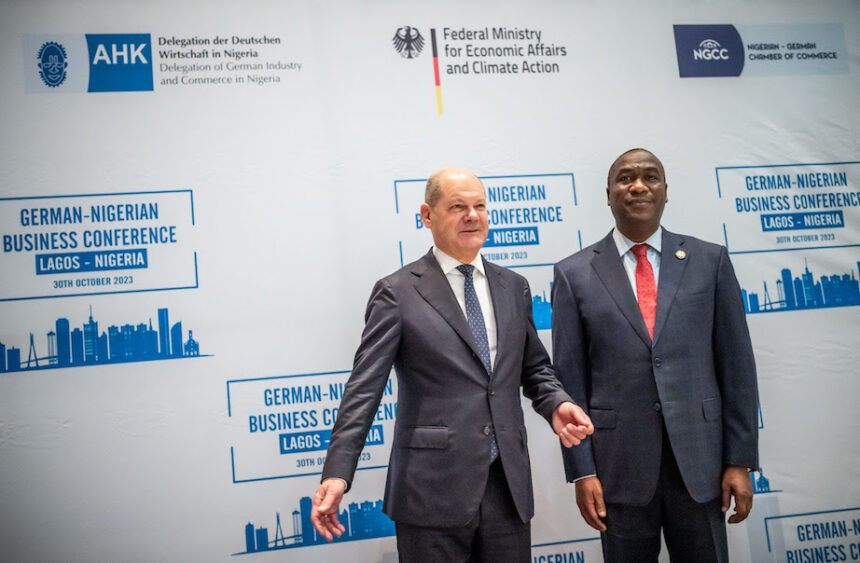By Michael Fischer, dpa I Monday, Oct. 30, 2023
LAGOS, Nigeria – German Chancellor Olaf Scholz has reiterated that he sees Nigeria as an important partner in the production of hydrogen and, transitionally, for the purchase of liquefied natural gas.
“Nigeria has an ambitious plan for the energy transition,” he said at an economic forum in Lagos on Monday. “And you are also well positioned to remain a key player for renewable energy and hydrogen – as well as for liquefied natural gas, which we will continue to need in the coming years until the hydrogen market is fully established.”
At the moment, Germany mainly buys oil from Africa’s most populous and economically powerful country.
There is criticism of the plan from within Scholz’s coalition: Green energy politician Lisa Badum called it a “scandal” that Scholz is “asking companies and states to increase their fossil fuel investments in the Global South.”
“We can’t really afford a climate chancellor who takes action when it comes to new fossil sources, but who sits on the sidelines when it comes to switching from dirty natural gas to renewables,” Badum said.
At Monday’s economic forum, Scholz also supported the establishment of the African Continental Free Trade Area (AfCFTA), which officially came into existence on January 1, 2021.
However, the implementation of the AfCFTA agreement is progressing slowly. It is intended to facilitate regional trade between 54 states, which is primarily hampered by high import duties and bureaucratic hurdles.
With almost all African states – with the exception of Eritrea – AfCFTA covers a market of some 1.2 billion people, making it the world’s largest free trade area. Later, a customs and monetary union and a common market are to be added.
The United Nations Economic Commission for Africa (UNECA) has not yet recorded a significant increase in regional trade.
Scholz said that as a member of the European Union, Germany is aware of the advantages of regional economic integration. “That is why we fully support Africa’s path towards AfCFTA, not only as the largest donor. But also by supporting the negotiations and the implementation.”
Scholz earlier repeated his call for a closer partnership to manage migration during his visit to Nigeria.
He stressed that in addition to facilitating the repatriation of Nigerians without the right to stay in Germany, the immigration of skilled workers must also be promoted.
To this end, migration centres that have been established in Nigeria to support returnees from Germany are to be expanded. According to Scholz, in future they should also take care of advising skilled workers who want to gain a foothold in Germany. “This requires some preparation and investment – on both sides,” the German chancellor said. He had spoken about this with Nigerian President Bola Tinubu on Sunday, he added.
“I am convinced that this is another area where we can exploit enormous potential arising from closer cooperation between our two countries and between our two continents,” Scholz said.
On Sunday, Tinubu had shown himself open to taking back refugees. Asked what he expected from Germany in return, he said at a joint press conference with Scholz: “I am not making any demand.”
If they are Nigerians, he said, they are welcome at home. The problem, however, is establishing their identity. Of the almost 14,000 asylum seekers from Nigeria who are obliged to leave Germany, about 12,500 are tolerated, mostly because they have no identity papers.
A visit to a migration centre is on Scholz’s agenda for Monday in Lagos, which with 20 million inhabitants is one of the largest cities in the world.
In the evening, Scholz plans to travel on to Ghana, the second stop on his three-day trip.
